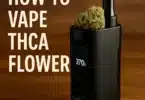With the rise of THCA flower on the hemp market, many consumers are asking: How does it compare to regular cannabis (THCA Flower vs Cannabis)? Both products come from the cannabis plant, but they differ in legal status, effects, and best uses. Whether you’re new to cannabis or exploring alternatives for wellness or recreation, this detailed guide will help you understand the key differences — and choose the right option for your needs.
What Is THCA Flower?
THCA (tetrahydrocannabinolic acid) flower refers to raw cannabis or hemp buds that are high in THCA but contain less than 0.3% delta-9 THC by dry weight.
👉 Non-psychoactive in raw form — THCA does not produce a high until it is heated.
👉 Converts to THC when heated — Smoking, vaping, or cooking turns THCA into THC through decarboxylation.
👉 Often marketed as hemp — THCA flower is legal under the 2018 Farm Bill if it meets federal THC limits.
What Is Regular Cannabis?
Regular cannabis (commonly called marijuana) refers to cannabis buds with high delta-9 THC levels — typically 10% to 30% or more — that are grown specifically for their psychoactive effects.
👉 Already psychoactive — Regular cannabis delivers immediate intoxicating effects when smoked, vaped, or consumed.
👉 Tightly regulated — THC-rich cannabis is a controlled substance under federal law but legal for recreational or medical use in certain states.
Key Differences Between THCA Flower and Regular Cannabis
| Feature | THCA Flower | Regular Cannabis |
|---|---|---|
| THC content (pre-heating) | <0.3% delta-9 THC | 10–30% delta-9 THC |
| Psychoactivity (raw form) | Non-psychoactive | N/A (typically consumed heated) |
| Psychoactivity (heated) | Becomes psychoactive (converts to THC) | Already psychoactive |
| Legal status (US) | Federally legal as hemp if <0.3% delta-9 THC | Federally illegal (Schedule I), legal in some states |
| Market | Sold online, in hemp shops, shipped across states (where legal) | Sold in licensed dispensaries (where legal) |
| Cost | Usually cheaper | Usually more expensive (due to taxes, regulation) |
| Availability | Wide (but varies by state) | Restricted to legal states |
| Main appeal | Legal alternative, dual use (raw or heated) | Stronger, consistent psychoactive effects |
Similarities Between THCA Flower and Regular Cannabis
✅ Same plant species — Both come from Cannabis sativa or Cannabis indica varieties.
✅ Same terpenes and cannabinoids — Both can provide rich flavor profiles and potential entourage effects.
✅ Same consumption methods — Both can be smoked, vaped, or cooked into edibles.
Which One Should You Choose?
👉 Choose THCA Flower If:
- You want a legal product in a THC-restricted state (but always check local laws).
- You’re interested in non-psychoactive, raw cannabis use (e.g., smoothies, topicals).
- You want flexibility: enjoy it raw or heat it (where legal) for psychoactive effects.
- You prefer affordable options that can be shipped (where allowed).
👉 Choose Regular Cannabis If:
- You live in a state where cannabis is legal for recreational or medical use.
- You want stronger, consistent psychoactive effects without needing to decarboxylate.
- You prefer buying from licensed dispensaries with tightly regulated products.
Health & Safety Considerations
| Factor | THCA Flower | Regular Cannabis |
|---|---|---|
| Drug tests | Heated THCA will cause positive THC results | Causes positive THC results |
| Combustion risks | Same as marijuana when smoked | Same combustion risks |
| Vaping advantages | Gentler on lungs, preserves terpenes | Same |
| Quality | Varies — important to buy lab-tested | Often tightly regulated for quality in legal markets |
👉 Tip: Always buy from reputable brands with Certificates of Analysis (COAs) verifying THC levels and safety (e.g., no pesticides, heavy metals).
Legal Considerations
🌱 THCA flower:
- Federally legal if <0.3% delta-9 THC (2018 Farm Bill)
- Some states regulate by total THC after heating
- Shipping and sales vary by state
🌿 Regular cannabis:
- Federally illegal
- Legal in states with recreational/medical cannabis programs
- Cannot be shipped across state lines
⚠ Important: Heating THCA flower can turn it into a legal risk in restrictive states (because it converts to THC).
Final Thoughts
Both THCA flower and regular cannabis have their place in the cannabis space — but which is right for you depends on your goals, your location, and your legal comfort level.
- If you want legal flexibility, raw use, or a hemp-derived alternative: THCA flower is worth exploring.
- If you want stronger, reliable psychoactive effects in a legal state: regular cannabis is the clear choice.
Either way, always source high-quality, lab-tested products — and stay informed about your state’s laws!







